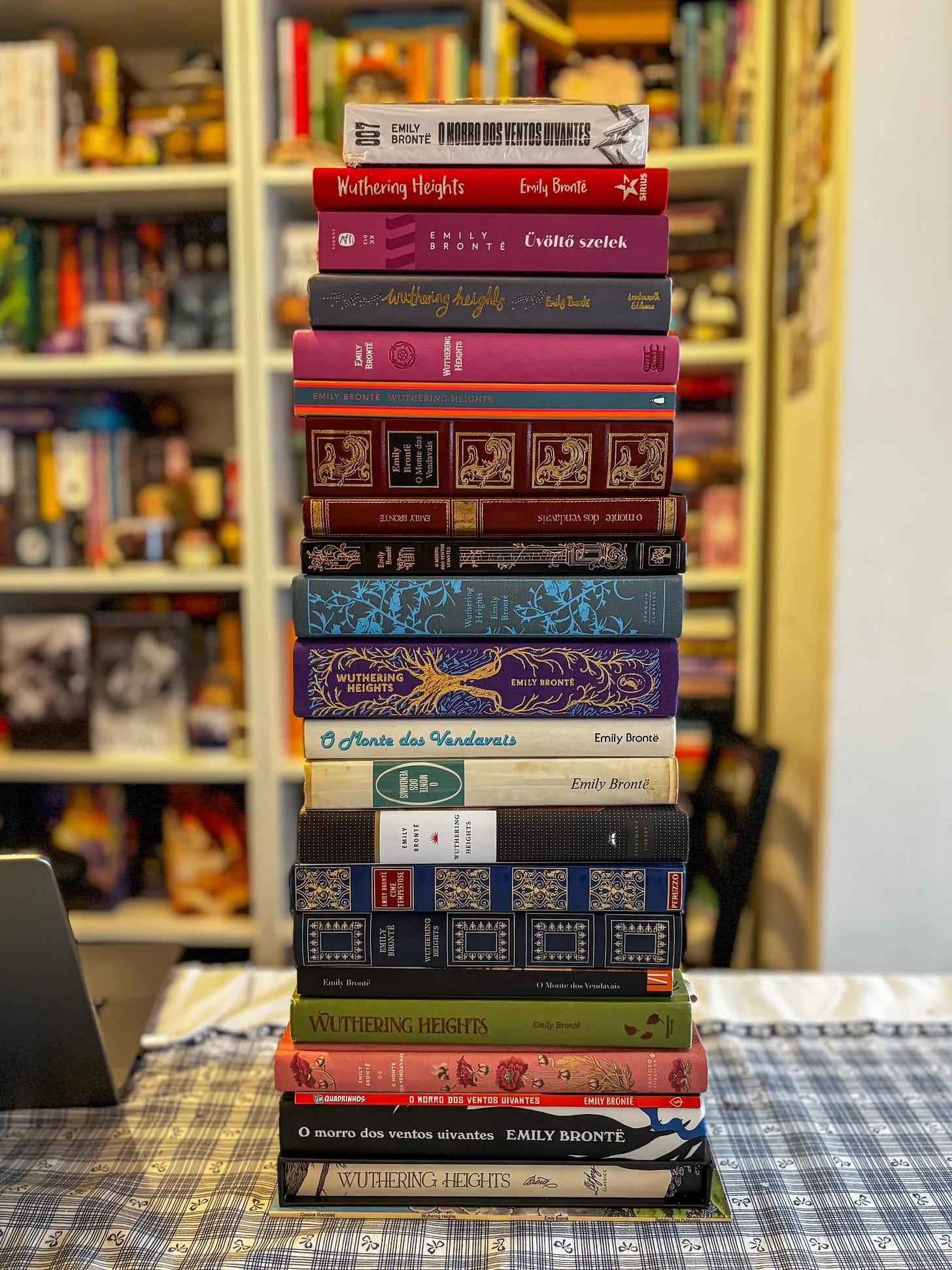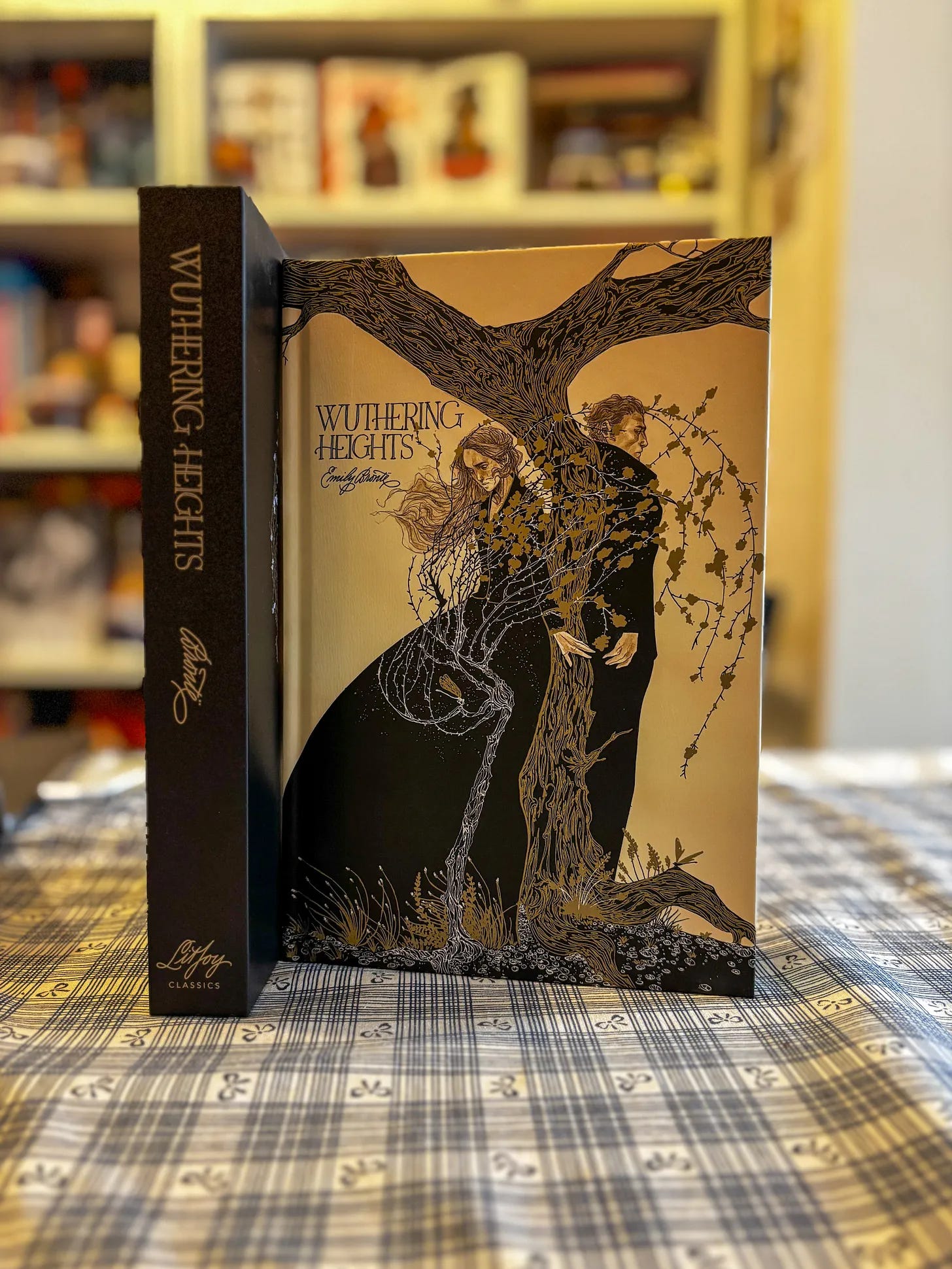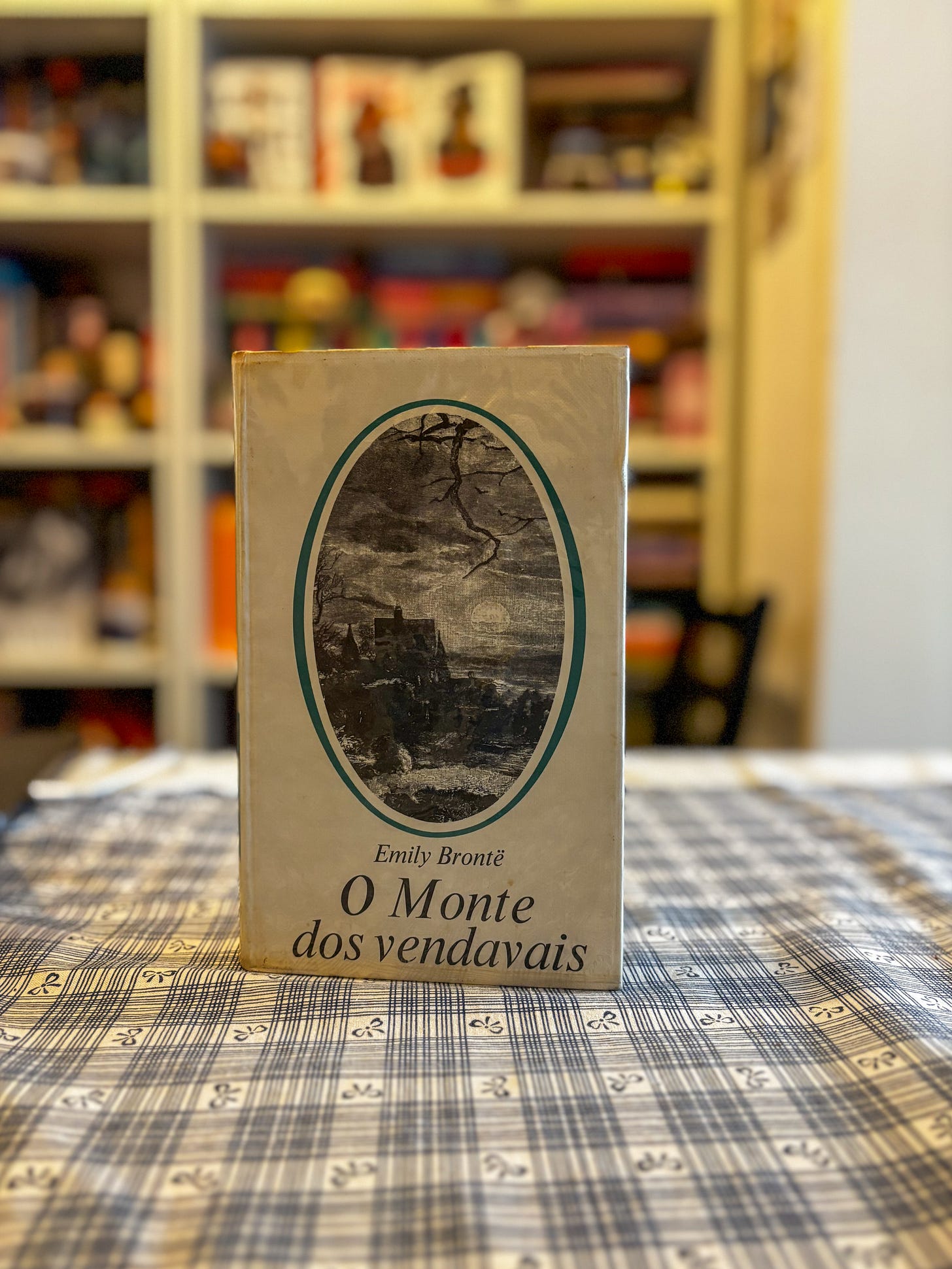How Wuthering Heights Took Over My Shelves (and My Teenage Angst)
On why I own 20+ editions of a book where everyone is miserable—and I love it.

My first edition of Wuthering Heights (O Monte dos Vendavais, Editorial Presença, 2009, translated by Fernanda Pinto Rodrigues) came into my hands in 2012, as a prize for winning first place in a high school literary competition. I had never read it before, and I remember that, although I found it strange at first, I devoured it very quickly. The gothic atmosphere, the stormy romance, the prejudice and intergenerational abuse all deeply unsettled me. But I only reread it two years later, already in university—and before I knew it, I was collecting. Today, I own more than 20—some in Portuguese, some in Brazilian Portuguese, English, Italian, and even Hungarian.1
I’ll admit: it’s hard to name a favourite edition2. I don’t even remember where or when I bought all of them. I do know, for instance, that the Puffin Clothbound Classics hardcover edition from Penguin—with an introduction by S. E. Hinton3—was a February 2023 purchase at Shakespeare & Company in Paris (I know, the cliché, but what can I say—magic happens there). The two editions from Brazilian publisher Antofágica—the hardcover and the mini, both translated by Stephanie Fernandes—came from Livraria da Travessa in Lisbon, where I also picked up a graphic novel version from Principis. I know I have two or three secondhand finds, and maybe three or four were gifts from friends and family.
The most recent addition4—a deluxe edition from Wordsworth Editions—was a Christmas gift from my partner. It’s almost as beautiful as the one from The Brontë Collection by Arcturus, which he also gave me (yes, he’s a keeper). But the truth is, each edition is special in its own way. If I had to explain why they’ve earned a spot on my shelves, I’d say it mostly comes down to cover art5—and in a few cases, the inclusion of original illustrations.
Of course, there are many more editions out there that make me swoon (and that I will eventually hunt down—let’s be honest). Off the top of my head, obvious dream editions include the Chiltern, the Signature Clothbound Editions, the Signature Gilded Editions, the Vintage Collector’s Classics, and especially the Folio Society version, illustrated by Rovina Cai. (If you own it… let’s talk.)
As for what truly matters—the story itself—it probably makes sense to start by saying that, during the turmoil of adolescence, the novel’s heavy—oppressive, even—atmosphere, filled with a sense of isolation and looming tragedy, struck a deep chord with me. It mirrored so much of the emotional intensity I didn’t yet know how to name6. Over the years, though, my take on the romance between Heathcliff and Catherine has changed completely—and gotten a lot more critical.
When I first read Wuthering Heights, I was taken in by what seemed like a wildly passionate love. Now, as an adult, I understand why this love provokes both fascination and discomfort: driven by possession and revenge, by a warped desire for mutual destruction, it’s a projection of Heathcliff and Catherine’s wounds and frustrations, a desperate attempt to grasp something the world around them doesn’t offer. It’s a love born of rebellion against what’s imposed—by society, by class, by family expectations—but one that, rather than freeing them, traps them even more.
Catherine, in particular, plays elaborate intergenerational mind games on everyone around her. Her manipulation and cruelty ripple through generations, inflicting emotional harm on those who come into contact with her. Heathcliff, too, is far from a tragic hero—he’s guilty of blackmail, kidnapping, grave robbing, abuse, and animal cruelty. His descent into monstrousness has a clear cause—he was abused by Hindley, whom he considered a brother for most of his childhood, and who forced him to live and work as a servant for the family as soon as he inherited the family home. Heathcliff’s torment is rooted in a deep, emotional betrayal, and his desire for vengeance against Hindley and the entire Earnshaw family becomes an all-consuming force.
The story is obviously much more about the struggle to break a cycle of violence and suffering than about the so-called romance. As the plot unfolds, we begin to understand how the wounds of the past—especially those born of neglect, abuse, and hatred—are perpetuated and passed down, with victims stepping into the role of their oppressors. But there is also, particularly toward the end, a glimmer of hope. The relationship between Hareton Earnshaw and Catherine Linton suggests it is possible to break that cycle.
If there’s a moral to Wuthering Heights, it’s that we must recognise the patterns we inherit and dare to disrupt them. Suffering doesn’t have to be inevitable, and repeating the mistakes of the past isn’t a fate we’re doomed to follow. However deeply rooted the ghosts of what we’ve been given might be, there’s always a way to choose differently. And now that I’m a mother, that’s something I think about more than ever.
But, if you haven’t read it yet, let me be upfront: Wuthering Heights is not the easiest classic to dive into. It’s a complex, intense, and unforgiving narrative. The relationships are toxic, and the structure itself can be a real puzzle to follow, especially with the alternating perspectives of Lockwood and Nelly. On top of that, the characters all seem to have multiple names, which can be downright infuriating. Seriously, who can keep track of who’s who when everyone is constantly switching between five different forms of saying their names? That said, Nelly’s role as the storyteller is one of the novel’s most genius elements. After all, the whole plot revolves around a servant spinning tales to the new tenant of Thrushcross Grange about the bizarre, dysfunctional characters at Wuthering Heights. Iconic.
What about you—what’s your relationship with Wuthering Heights? Is it a forever favourite, a literary love-hate, or one of those books you’ve been meaning to read someday? Have your feelings about it changed over time, like mine did?
Lately, I’ve been diving deep into poetry—something about its quiet intensity fits this season of life. As a first-time mom, I’ve found that poems—brief, but emotionally expansive—fit into the cracks of my days in a way that longer reads can’t right now.
I’m especially taken with A Importância do Pequeno-Almoço (The Importance of Breakfast), by Francisca Camelo, a contemporary Portuguese poet whose voice feels both intimate and razor-sharp. This collection talks about the invisibility of domestic labour and the theory of social reproduction from a feminist perspective. The kind of work that holds up entire households—and goes unnoticed, unthanked, and unpaid. It’s tender, political, and quietly defiant—exactly the kind of poetry that stays with you.
As a woman—and now, as a mother—this viscerally hit home. Just the other day, I found myself reheating my coffee for the third time (a true postpartum rite of passage) while bouncing the baby in one arm. It struck me how much of my day is made up of things no one sees: wiping surfaces, soothing cries, folding impossibly tiny socks. And yet, these things form the architecture of care, the soft and often invisible infrastructure of a life.
Camelo’s poems don’t scream; they murmur, they prod, they show you the dust gathering in the corners and ask you not to look away. Reading her feels like being seen in all the ways that usually go unnoticed. It’s also a reminder that the smallest acts—preparing breakfast, remembering someone’s preferred mug, knowing the right lullaby at the right time—carry their own quiet, radical significance.
The Importance of Breakfast, by Francisca Camelo (translated by me)
every woman knows that
you have to maintain the troops:
ironing the uniforms, giving birth to heirs, scrubbing the floors / from
knees, the grime comes out better
who else can explain to children the absence
of the soldier, the factory worker, the fervent politician who puts
the bread on the table
if sex is political, imagine the housework
hand-washing the stains of wine / semen / blood
making the bed when it’s empty
gathering the necessary nutrients on the plate
for the capitalisation of the adulterous father
after making breakfast
the anchor women moored in the cove
watch in silence as the Dom João’s armoury, the
first / the previous / the father of this
depart so that now – this is not new –
at least fifteen thousand males follow boldly.
the idea is the same as always:
burn forests / raid mines / rape Indigenous people / baptise
lands that already had a name
reproduce hospices and rooms lined with yellow wallpaper
bury the seed deep in the cervix of the uterus
and gradually generate new, delicate mannequins with calloused hands
let the previous generation teach the next to make coffee
(attention. you don’t make coffee just any old way, you have to form
a pyramid of powder, don’t let the water touch the funnel, don’t
switch it on immediately at maximum temperature, give it
the right boiling time, but keep going)
pouring it hot into the cup in the morning
eating that steaming loaf of bread on the miraculously clean table
picking fresh fruit, appreciating the clean dishes
never returning
to the abandoned sodom
because by then
the coffee has already cooled
those who make breakfast
know all this
return home alone and their hands
always invisible
sew pain like rosary beads
in their teeth and open figs in place of lips
only those who eat breakfast
have their mouths too full
to realise what’s fundamental:
is that without them
the world wouldn’t even
arrive at midday.
If you’ve read a poetry collection that’s resonated with you—especially in motherhood or moments of transition—I’d love to hear about it. What poems are keeping you company these days?
There have been about a dozen film adaptations of Wuthering Heights, yet, oddly enough, I’ve never seen a single one. The earliest dates back to 1920, while the most recent was released in 2011. Now, there’s a new version in the works, starring Margot Robbie and Jacob Elordi, set to hit theatres in 2026. (I love the actors, but I hate the casting. Elordi as Heathcliff? The character is described as “dark-skinned” and possibly of non-white heritage, and they cast a white actor. Yeah, not a fan of that decision.7) That said, I’m curious enough to consider seeing it on the big screen if only to witness the potential trainwreck. Before that, though, I’m looking forward to finally watching Emily (2022), with Emma Mackey playing Emily Brontë. Now that I can get behind.
If you’re in the mood for more Brontë, here are a few suggestions to sink your teeth or ears into:
The Reader’s Guide to Emily Brontë’s ‘Wuthering Heights’, by Paul Thomson;
Close Readings: ‘Wuthering Heights’ by Emily Brontë, with David Trotter, Patricia Lockwood and Thomas Jones;
The strange cult of Emily Brontë and the ‘hot mess’ of ‘Wuthering Heights’, by Kathryn Hughes;
‘Wuthering Heights’ with Dr Rebekah King, by author Hanna Delaney, from A Work of Fiction’ newsletter; and
Wuthering Heights with Essie Fox, by Caroline Rance, from She Wrote Too newsletter.
Anyway, if you’ve ever thought about starting a book collection (and let’s be honest, who hasn’t?), this article is a must-read. It offers tips on how to do it in a conscious and organised way, which, trust me, will save you from that pile of books growing in the corner. And, for those who want to approach book collecting as a professional endeavour, there’s also this collecting guide, which is particularly valuable, offering several glossaries that teach you how to identify different formats, sizes, and states of preservation. Whether you’re after rare finds or simply want to curate your own library thoughtfully, it will help you navigate the world of book collecting with ease.
If you enjoyed this issue, don’t forget to spread the word — the more, the merrier! I’d also love to hear your thoughts, so feel free to reach out. It helps keep this community growing and thriving.
If you’d like to support my writing, here are a few lovely ways to do it (thank you so, so much):
I can’t read Hungarian, but it was a gift from a dear friend who brought it back from Budapest. And honestly? That cover alone earned it a place on the shelf.
The LitJoy edition, with its exclusive features—including six beautifully illustrated pages by Abel Klaer—it’s definitely one of my top 5 favourites.
S.E. Hinton’s fame stems from her debut novel, The Outsiders, a young adult classic that sold over 15 million copies and was adapted into a successful film.
In fact, the latest addition to my Wuthering Heights collection is on its way: the same friend who gave me my Hungarian edition went to Italy and brought me an Italian one (I already have one, but if they have different covers then you can never have too many).
I’m not saying I judge books by their covers… but I definitely collect them by their covers.
The novel explores the impact of environment and upbringing on character, a theme that can be particularly relevant to teenagers who are still developing their own identities.
The character’s ethnicity is a point of ambiguity in the novel, but many readers interpret his appearance as an important aspect of his identity—especially in the context of his mistreatment at Wuthering Heights, which is tied to class, race, and social status.












Nunca li O Monte dos Vendavais, e só agora li o meu primeiro Brontë. Tenho um de cada uma das irmãs, que comprei precisamente porque são edições maravilhosas (de capa, pelo menos).
Queria ler todas as Brontë até ao final do ano, e já estava inclinada a pegar n'O Monte dos Vendavais a seguir, e este texto pregou o último prego nessa resolução 😋 Definitivamente fizeste o livro parecer interessante!